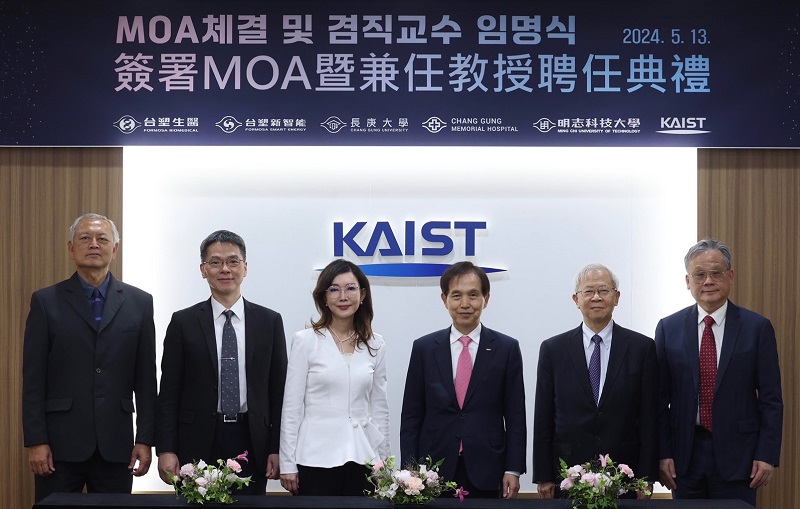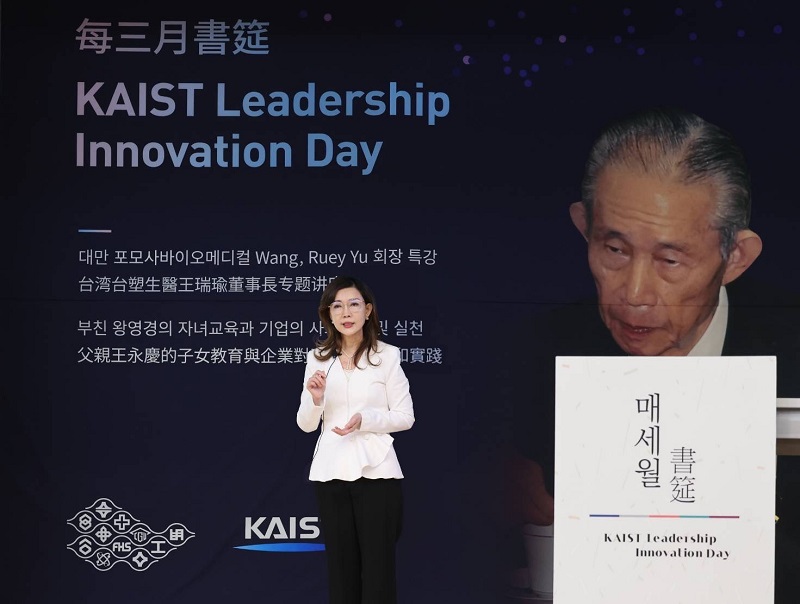Formosa Plastics Group joins hands with South Korea top university KAIST Global industry-academic-research cooperation accel-erates innovative research in biotechnology and new energy
2024 / 05 / 22
Formosa Plastics Group (FPG) has announced the signing of a cooperation agreement with the Korea Advanced Institute of Science and Technology (KAIST), based on which a global industry-academic-research project team will be established between KAIST and FPG affiliations, including Chang Gung Uni-versity, Ming Chi University of Technology, Chang Gung Memorial Hospital, Formosa Smart Energy, Formosa Biomedical Technology, and Ivy Life Sciences. The goal of this cooperation is to forge a close partnership in the fields of bio-technology and new energy, and focus on groundbreaking advanced research and development in realms such as stem cells, gene therapy, energy storage batteries and automotive technologies. By accelerating the transfer of scientific research outcomes to industrial applications, Taiwan and South Korea seek to join hands in creating a healthier and more sustainable future for the entire world.
KAIST is one of South Korea's top universities. Often lauded as South Korea's MIT (Massachusetts Institute of Technology), KAIST’s engineering and technolo-gy research is in particular internationally renowned. In May, Executive Member Sandy Wang of FPG Executive Management Committee personally headed a del-egation of representatives from Chang Gung University, Ming Chi University of Technology, Chang Gung Memorial Hospital, Formosa Smart Energy, Formosa Biomedical Technology, and Ivy Life Sciences on a visit to South Korea to sign the cooperation agreement with KAIST and engage in in-depth interactions, offi-cially launching a new era of international cooperation.
According to Sandy Wang, FPG will be working with KAIST to jointly expand research and developments in the fields of biotechnology and new energy. The first step of the cooperation will be strengthening industry-academic cooperation and academic exchanges. Important future plans include visiting professorships, student exchanges, seminars and resource integration. The transnational cultiva-tion of high-level talents and R&D outcomes thus engendered will further pro-mote industrial upgrades and technological innovation. As such, the project will not only stimulate the potential and creativity of the two parties, but will also be-come a new benchmark for cooperation on pursuing mutual prosperity and excel-lence in academic achievements, scientific research, and industrial development for both Taiwan and South Korea.
Sandy Wang indicated that with respect to biotechnology, the two parties plan to engage in extensive stem cell and gene therapy research and leverage each other's advantages to create synergistic effects. For example, Chang Gung Memorial Hospital, which has been established for almost half a century, has a rich store of clinical data and is the largest medical system in Taiwan, while KAIST has out-standing achievements in medical research but no clinical environment. In the fu-ture, the two sides will be able to complement each other in this respect and are expected to make breakthrough progress in promoting precision treatment and comprehensive health across all age groups.
In terms of new energy, both parties are deeply committed to developing key technologies such as lithium batteries, electric vehicles, and power management for the new energy industry. In particular, FPG has been investing in the produc-tion of lithium iron phosphate materials and battery modules since 2008. As such, it is fully prepared for engaging in in-depth cooperation with the KAIST Research Center for Next Generation ESS to improve battery technology and effi-ciency, develop more diversified and high-level battery application models, and drive industrial upgrades with new and emerging technologies.
During this visit, Sandy Wang was also invited to attend a KAIST seminar as a keynote speaker, sharing the entrepreneurial spirit and outlook on life of Wang Yung-Ching, the founder of FPG, with a South Korean audience. As Sandy Wang stated, the FPG founder practiced diligence and simplicity, and created a unique management system that enabled him to ultimately build an empire in the form of the FPG from the humble beginnings of a small rice store. All throughout his life, he advocated conservation and the cherishing of resources, while also actively es-tablishing schools and hospitals as part of his profound commitment to contrib-uting to society. According to Sandy Wang, the founder's forward-looking vision and comprehensive layout has been her inspiration for the founding of Formosa Biomedical Technology and Formosa Smart Energy. By promoting the develop-ment of preventive medicine and new energy, it is the hope of both Sandy Wang and entire FPG to create a better world for mankind.







